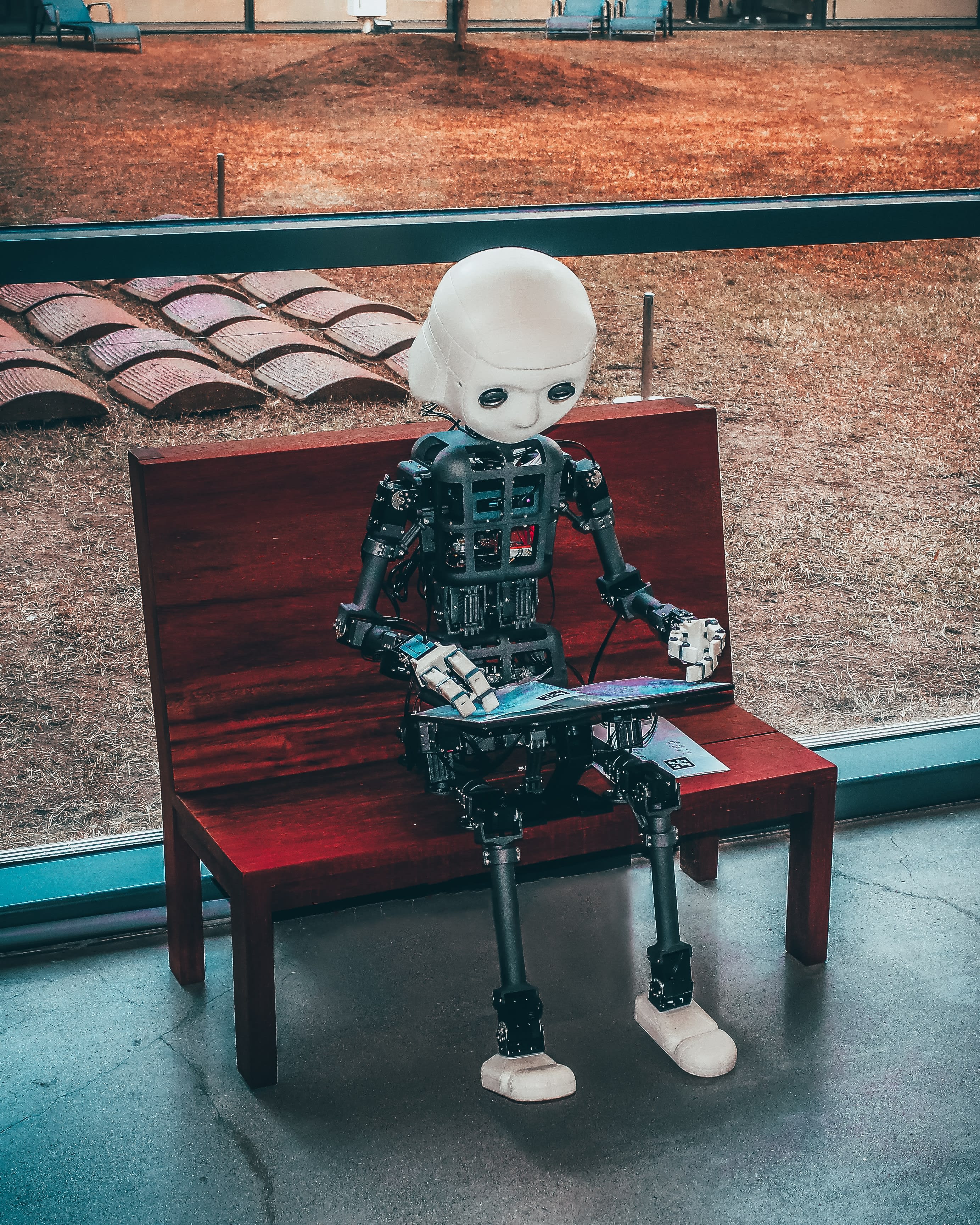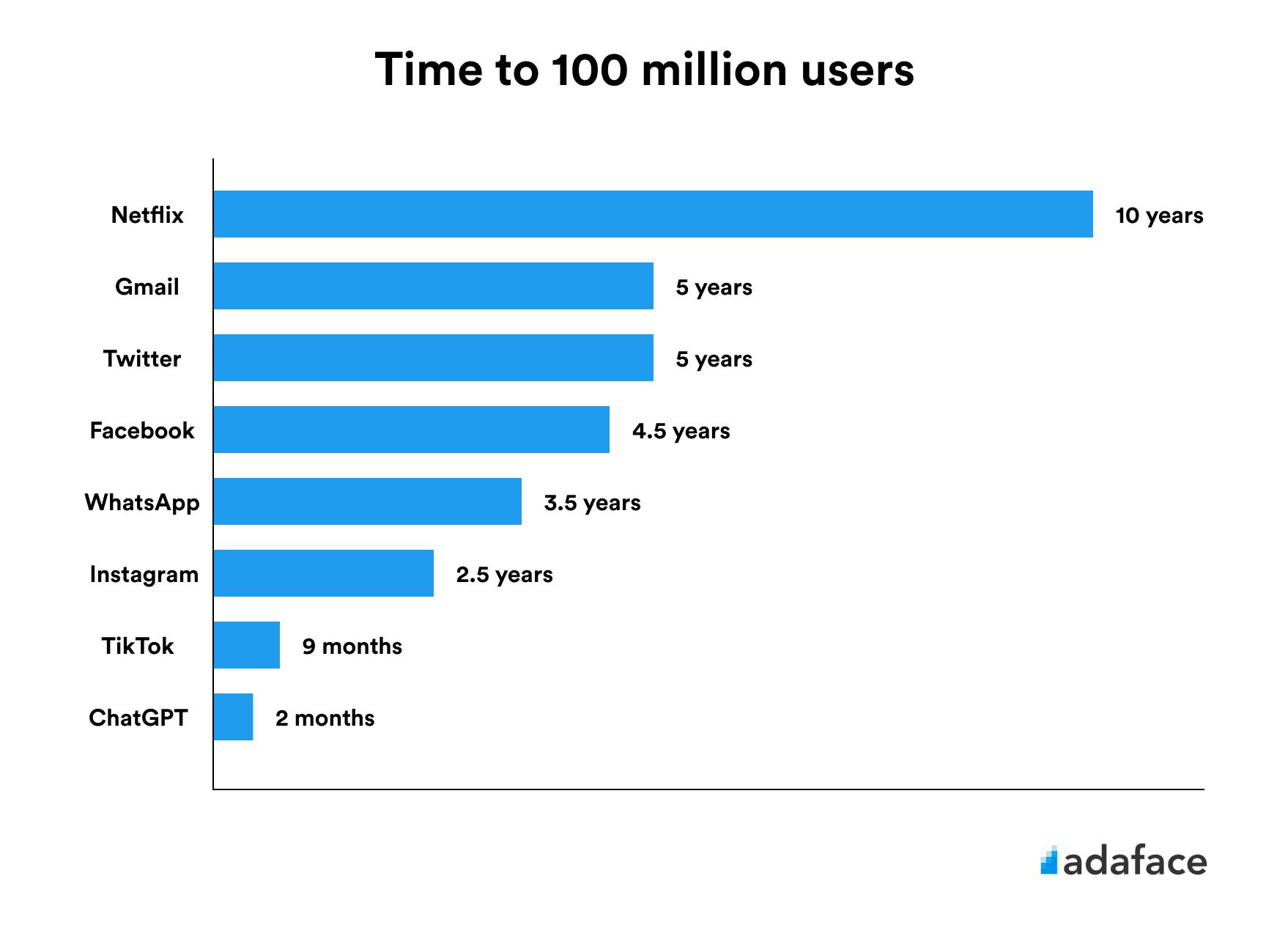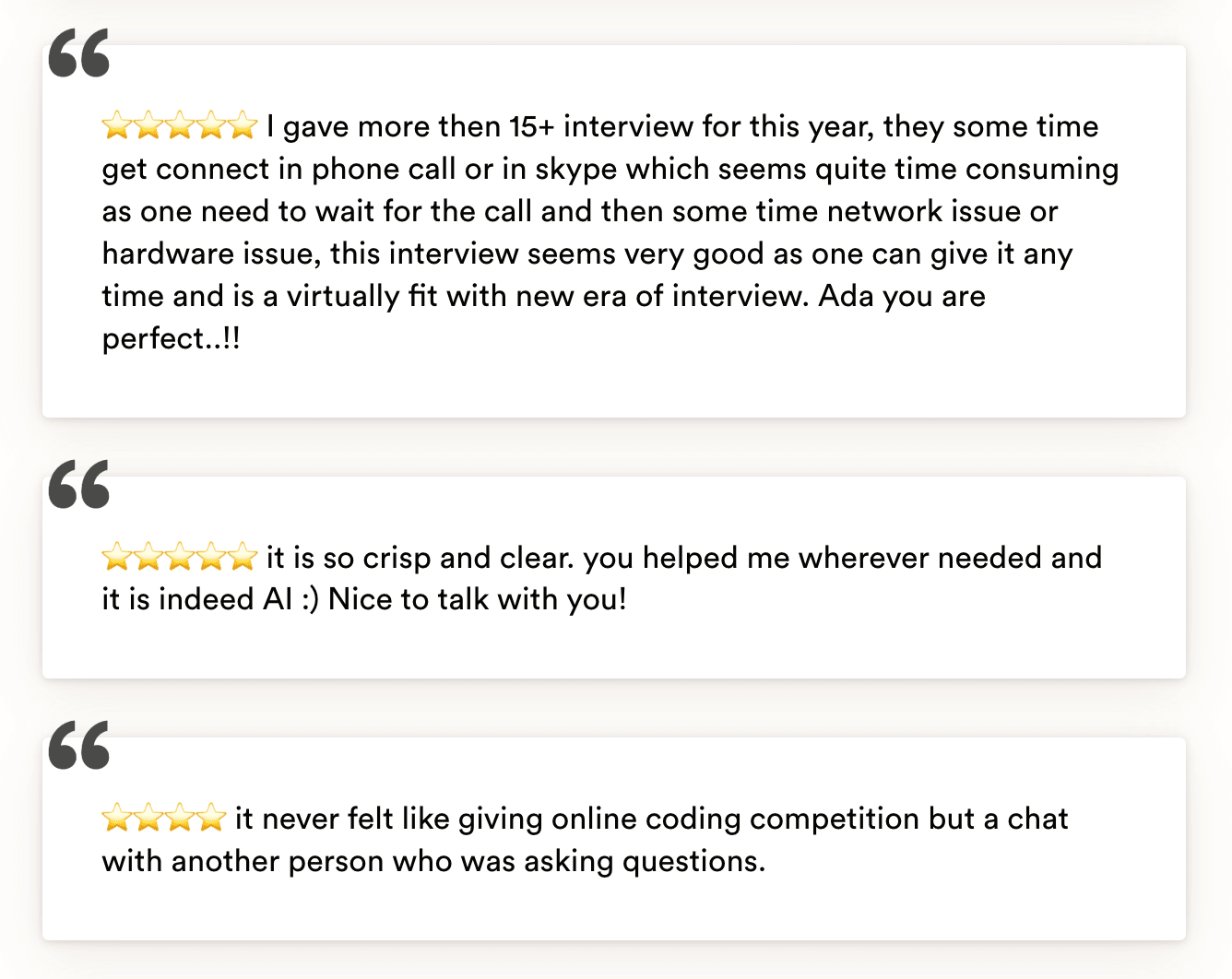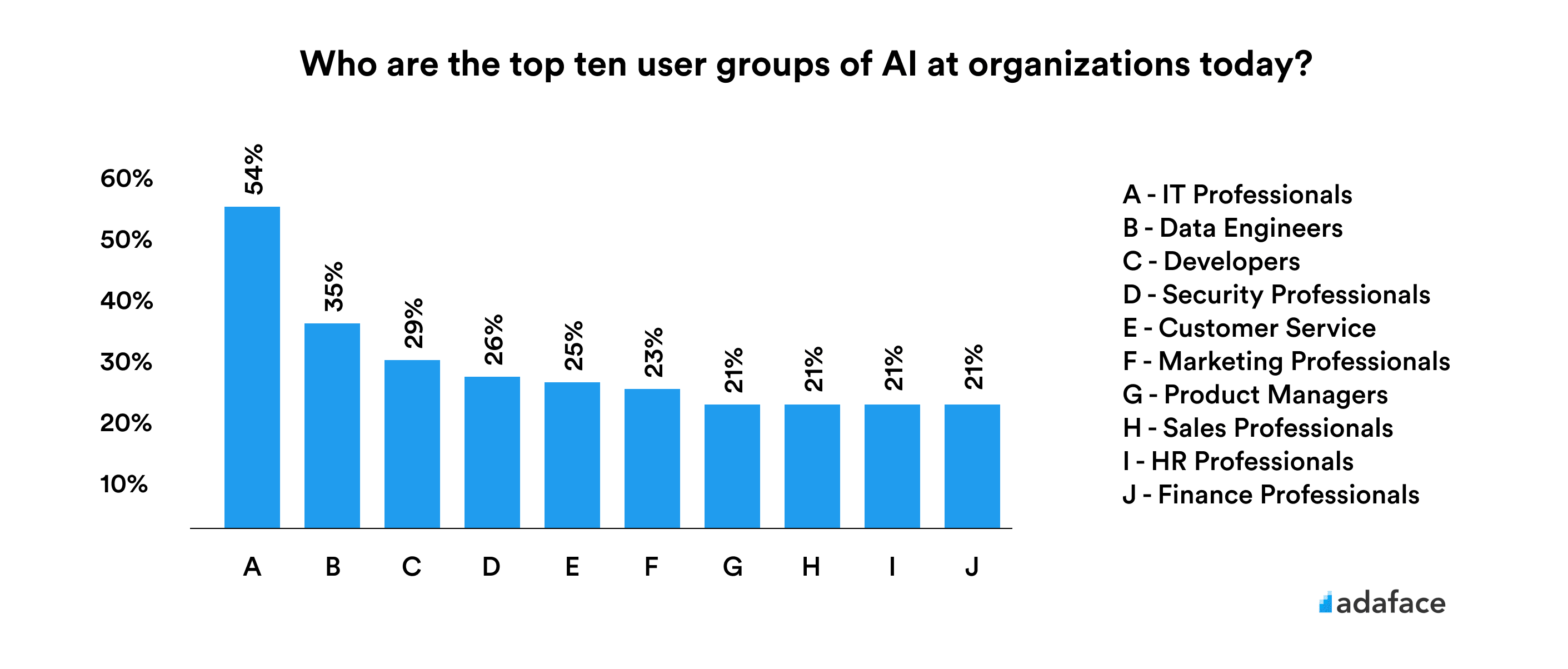
First things first, let's be clear about what exactly we mean by AI. AI does not mean we are living a real-life Terminator scenario with a possibility of the end of all human life (not yet atleast).
AI, or artificial intelligence, refers to the development of computer systems that can perform tasks that typically require human intelligence. For example, instead of you having to screen through hundreds of resumes just to notice that only a handful are credible, an AI system will do that for you.
Through this post, we’ll try to answer some questions that have been pondering in the minds of HR folks.
- How can AI be used in recruitment?
- What are the potential risks and challenges of using AI in HR?
- How can HR professionals ensure that AI is used ethically and responsibly in their organizations?
- How will it affect the role of HR in organizations?
AI in HR
According to Reuters, ChatGPT reached 100 million monthly active users by January, just two months after its launch. For perspective, here are some popular products and the time it took for them to reach the same milestone.

“It wasn’t the underlying model that mattered, it was the usability of it.” - Sam Altman (CEO of OpenAI), on ChatGPT
We see a similar trend in the HR industry as well. Products are being developed such that their usability is what makes them stand out and that they provide value in the HR space.
Products are being developed in four main categories:
- Automated sourcing and screening of resumes
- Use of chatbots for candidate engagement
- Employee onboarding and training
- Predictive analytics for employee engagement and retention
Automated sourcing and screening of resumes
When it comes to resume screening, AI-powered recruitment tools use machine learning algorithms to quickly and accurately analyze resumes and match them with job requirements. The main reason this is beneficial and continues to grow in popularity is the fact that it reduces your time to hire.
Statistics show that on an average each job posting receives 250 resumes, out of which only 4-6 candidates are called for an interview.
AI-powered resume screening can save HR professionals time and effort while also improving the accuracy and efficiency of the recruitment process.
We all want to make faster and better hiring decisions. However, this is an oxymoron. When you reduce time spent on hiring, your quality of hire usually goes down. When you try to improve your quality of hire, you normally spend more time making this decision.
This is where AI systems can help us out.
When engaging with candidates throughout the recruitment process, chatbots play an important role. Chatbots are essentially automated messaging systems that can communicate with candidates via text or voice chat.
It helps candidates feel like the recruitment process is engaging. Simultaneously, it saves time for HR folks which allows them to focus on other crucial tasks of the recruitment process.
It’s safe to say candidates love the interactive experience chatbots can provide. Especially the conversational skills assessment with our chatbot, Ada.

Employee onboarding and training
AI-powered chatbots, virtual assistants, and other tools can be used to guide new hires through the onboarding process, answer their questions, and help them build the skills they need to succeed on the job. And because they're available 24/7, employees can access them whenever and wherever they need to, without having to wait for a scheduled training session.
According to a report by Deloitte, companies that use AI for onboarding and training see a 30-50% increase in productivity.
But AI isn't just for new hires. It can also be used to provide ongoing training and development opportunities for existing employees.
By analyzing performance data and identifying knowledge gaps, AI-powered systems can recommend personalized training modules and resources that help employees build the skills they need to advance in their careers.
Predictive analytics for employee engagement and retention
By analyzing large amounts of data on employee behaviour and sentiment, predictive analytics can identify patterns and correlations that can help predict which employees are at risk of leaving the company. This can help HR professionals take proactive measures to retain key talent and improve employee satisfaction.
One of the key benefits of using predictive analytics for employee retention and engagement is that it allows HR professionals to make data-driven decisions rather than relying on intuition or guesswork.
According to a study by Deloitte, more than half (56%) of companies are already using predictive analytics for workforce planning and employee retention, with another 20% planning to use it in the next two years.
Risks and ethical considerations
We have already seen dozens of examples regarding how ChatGPT is biased and “woke”. For example, when fed the same prompt about President Joe Biden and Former President Donald Trump, this is how it responded.
The damage done to the credibility of AI by ChatGPT engineers building in political bias is irreparable. pic.twitter.com/s5fdoa8xQ6
— 🐺 (@LeighWolf) February 1, 2023
In 2018, Amazon's resume screener tool began to exclude women from its shortlisted candidates. When it came across words such as "women’s chess club” or “women’s soccer team, it would exclude these resumes due to the fact that the tool was trained on existing Amazon employees, who were majority male employees.
As you can see, the damage bias can do to your organization is very high. It can affect the kind of people who are shortlisted through resume screening. There is also a risk of bias in analytics provided for talent management. All these can affect the kind of employees you hire and the ones you retain.
This is why human oversight is critical in the use of AI in HR. HR professionals should be actively involved in the design and implementation of AI-powered systems, ensuring that they are transparent and fair.
Transparency and accountability are essential components of any AI-powered HR process. In order to ensure that AI systems are being used fairly and ethically, it's important to be transparent about how they work and to hold them accountable for their results.
AI in HR statistics
Bill Gates on the development of AI:
“I knew I had just seen the most important advance in technology since the graphical user interface.”
Statistics on AI in HR are evidence that AI in HR will keep growing. Let's look at the future of AI in human resources through the lens of statistics.
Key findings
- Automation and AI will continue to transform the talent acquisition process by automating routine tasks, such as resume screening, scheduling interviews, and candidate outreach.
- More organizations will adopt automation and AI to increase efficiency and save time in HR processes.
- As organizations increasingly adopt AI and automation tools, there will be a greater need to ensure that these tools are used effectively and do not accidentally overlook or exclude qualified applicants or employees.
Statistics
- A study by Deloitte found that 33% of HR leaders believe that AI will transform their talent acquisition process by automating routine tasks such as resume screening, scheduling interviews, and candidate outreach.
- 85% of employers that use automation or AI say it saves them time and/or increases their efficiency.
- 64% of HR professionals say their organization's automation or AI tools automatically filter out unqualified applicants.
- Over 2 in 3 HR professionals say the quantity of applications they must manually review is somewhat (44%) or much better (24%) due to their use of automation or AI.
- 92% of organizations that use automation or AI source some or all of these tools directly from a vendor.
- 19% of organizations that use automation or AI have experienced those tools accidentally overlooking or excluding qualified applicants or employees.
- While 30% say the use of automation or AI improves their ability to reduce potential bias in hiring decisions, 46% would like to see more information or resources on how to identify any potential bias when using these tools.
- About 68% of recruiters believe using AI in the recruitment process will remove unintentional bias.

On a final note
From automated resume screening and chatbots for candidate engagement to predictive analytics for employee retention and on-the-job training, it's clear that AI is transforming the way HR professionals do their jobs.
But as we've seen, the benefits of AI in HR don't come without their challenges. It's important to remember the role of human oversight in ensuring fairness, transparency, and accountability in AI-powered HR processes. And as with any new technology, there's always the risk of bias and error that must be mitigated through careful design and testing.
However, it's time to jump on the AI bandwagon and reap the benefits of AI in the HR industry since they far outweigh the risks.
References
- Tidio - AI Recruitment Statistics
- SHRM - AI in HR
- Deloitte - Global Human Capital Trends - 2019
- Oracle - AI in Human Resources
FAQs
What are the ethical considerations when using AI in HR?
There are several ethical considerations when using AI in HR, such as ensuring that the AI tools used are free from bias, protecting employee data privacy, and being transparent about the use of AI in HR processes. It's important for HR professionals to carefully evaluate the potential impact of AI on employees and ensure that it is used in a responsible and ethical manner.
What are some examples of successful AI-powered HR implementations?
There are several successful AI-powered HR implementations, such as Unilever's use of AI to reduce bias in its recruitment process, Hilton's use of AI chatbots for candidate engagement, and IBM's use of AI for personalized employee learning and development. These implementations have helped organizations streamline HR processes, improve employee engagement and retention, and make data-driven decisions.

Pragnesh is the EiR at Adaface. He loves reading books more than scrolling through social media, which is a big deal if you ask him.
Spending too much time screening candidates?
We make it easy for you to find the best candidates in your pipeline-
with a 40 min skills test.


